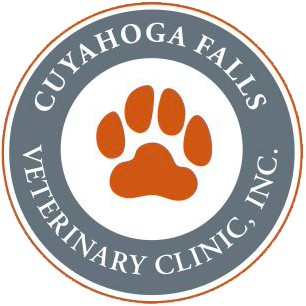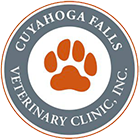“How often should my pet see the veterinarian?” This is a question that we at the Cuyahoga Falls Veterinary Clinic hear very often.
 Let’s begin by thinking about this in human terms. How often do you go to the doctor? (For some, it’s probably better to ask, “How often is it recommended that you go to the doctor?” : )
Let’s begin by thinking about this in human terms. How often do you go to the doctor? (For some, it’s probably better to ask, “How often is it recommended that you go to the doctor?” : )
Some people visit their doctor for annual physical examinations. Others visit their doctor only when they get sick. For the “only visit when they’re sick” crowd, some of them get sick frequently (more doctor visits) while others almost never get sick (doctor visits have many years in between). This may be all fine and good for us. We can tell our families and our doctors when we’re sick. We can tell them where it hurts or what doesn’t feel right.
But sometimes we feel fine and our doctor catches something under the surface that we didn’t know about. The folks who make annual visits are thankful when a hidden disease is caught early when it’s treatable and curable.
Let’s face it, though. Our cats and our dogs don’t often tell us when they’re not feeling well. We notice the vomiting, the accidents in the house, the coughing and the lameness. But most owners don’t notice the subtle but gradual weight loss, the brewing dental disease, or the heart murmur.
Pets age faster than we do. One year of an animal’s life equates to many years in a person’s life. Because cats and dogs age more quickly than humans, and because they can’t talk to us and tell us just how they’re feeling, it is important that young animals see the veterinarian at least yearly and that senior animals see the veterinarian at least every 6 months. (Cats older than 7 years, small to large breed dogs older than 7 years, and giant breed dogs older than 5 years are considered seniors.)
Nobody’s time is wasted when an animal gets a clean bill of health from the veterinarian. In fact, that’s what we want! On the other hand, detecting an underlying illness or disease, lump or bump, arrythmia or murmur when it’s early makes it much more likely that the problem can be cured or managed. Waiting until a mass has grown too large or a murmur has progressed to congestive heart failure makes it very difficult to have a happy ending.
The foundation of good preventive medicine is regular physical examinations. Get into the habit of seeing the veterinarian on a regular basis (annually or semi-annually, depending on the stage of life) and put your pet-friend in the best position for the best quality-of-life.


The Cuyahoga Falls Veterinary Clinic | Animal Wellness | Medical Services | Pet Services
[…] Regular Examinations for Optimal Health […]
The Cuyahoga Falls Veterinary Clinic | Animal Wellness | Medical Services | Pet Services
[…] a related note, we at the Cuyahoga Falls Veterinary Clinic believe that preventive medicine is the best medicine. Sickness and disease can be more easily managed, treated and sometimes cured when it is caught in […]
The Cuyahoga Falls Veterinary Clinic | Animal Wellness | Medical Services | Pet Services
[…] in an accident or emergency is an important consideration. For those who are serious about their pet’s care and well-being, the American Red Cross suggests enrolling in one of their upcoming Pet First Aid and CPR For Dogs […]
The Cuyahoga Falls Veterinary Clinic | Animal Wellness | Medical Services | Pet Services
[…] is it important to examine a cat at least once per year? Because cats are fantastic at hiding illnesses and abnormalities. One area that can cause pain and […]
The Cuyahoga Falls Veterinary Clinic | Animal Wellness | Medical Services | Pet Services
[…] suppose it is encouraging that 79% of the survey participants visit their veterinarian regularly for shots and checkups (it could be worse), but it is discouraging that 2 out of 2 respondents […]
The Cuyahoga Falls Veterinary Clinic | Animal Wellness | Medical Services | Pet Services
[…] you only remember one idea after reading this post, make sure it is this: performing a thorough physical examination and establishing a minimum database is of utmost […]
The Cuyahoga Falls Veterinary Clinic | Animal Wellness | Medical Services | Pet Services
[…] mucous membranes, and lethargy. There are other symptoms that we can determine while performing a physical examination such as an increased heart rate, fluid in the lungs, weak pulses and/or a heart […]